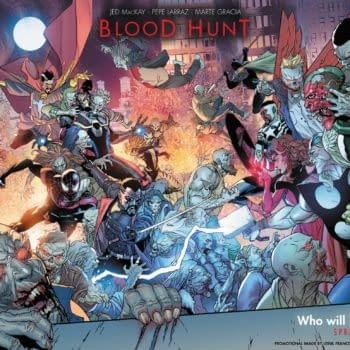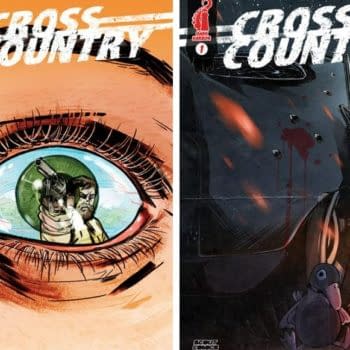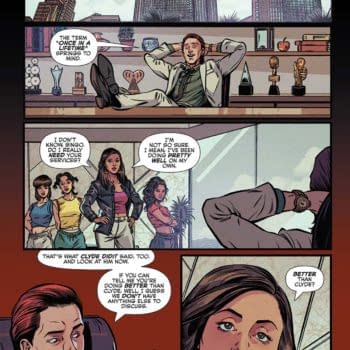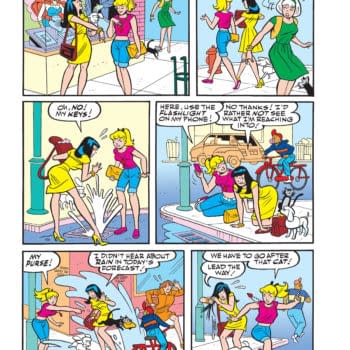Posted in: Comics, Recent Updates | Tagged: Comics, fantagraphics, journal
Greg Baldino Reads Comics Journal #301

The last two decades have not been kind to magazines. Blame it on the internet if you will; websites (like this one) made it possible to find the content you want, when you want it, and aside from whatever you pay for your internet connection, get it for free. A lot of publications have now settled into a duel presence in print and online, others have made the jump to virtual completely (bOING bOING abandoned paper and thrived, while poor lamented Omni left the newsstands for cyberspace too soon and vanished into memory.) So it wasn't too terribly shocking when in 2009 The Comics Journal ceased publishing in print with their 300th issue and became another comics website.
Well, it's back.
Relaunching in a book-sized format, Comics Journal #301 came out from Fantagraphics this summer, and has already gone through a second printing. The magazine is dense, with over three hundred pages, containing enough essays, interviews, reviews, and art pages to easily fill 2-4 of the old issues.
For a long time in the American market, the Comics Journal was the high point of comic book intellectualism, sitting on the far side of the spectrum from Wizard Magazine, the two periodicals represented the extremes of comics reportage in both the best and worst ways. When the Journal originally ceased priting, it raised a slightly disturbing question: was the critical discourse of comics done?
The new format is impressive, and suggests an eye for bookstores and libraries moreso than comic shops and newsstands. The cover itself is a detail from Robert Crumb's adaptation of Genesis, and the title and content details is printed on the ample spine. It's prepared and ready to be shelved, which is rather smart.
The opening feature is nearly two hundred pages on Crumb's biblical adaptation. Publisher Gary Groth interviews Crumb, and while it's not a unique interview subject for the Journal, the specific focus on a major work is still interesting. Following this is a "roundtable of essays by several critics on the successes and failures of the adaptation, followed by yet another of shorter pieces by the essayists critiquing each other's critiques. In essence, it's a book on Crumb's adaptation packaged in with an already ample magazine, although I can't help but wonder if the adaptation sincerely merits that much analysis and post-analysis.
But that's the Comics Journal for you; and while it sometimes goes deep into circumloquacious overthinking, it's to their credit that they consider comics worth this much consideration.
Other interviews include Joe Sacco on his recent work Footnotes and Gaza, and a back in forth between Mad Magazine cartoonist Al Jaffee and Tales to Thrizzle creator Michael Kupperman. The latter revisits issue 300's motif of professionals interviewing each other in conversation, and it's a more richer and original format that the magazine could greatly benefit from as a regular feature.
Three graphic novels are reviewed, and while they're well done with the usual CJ thoroughness, I can't but help wonder if something as transitory as review fit better on their website than the long-term format of the new Journal.
The new format allows for a large selection of art pages, including excerpts from Jim Woodring's sketchbook and a complete full-color reproduction of Theodore Geisel's Gerald McBoingBoing comics. Format-wise, they're really taking advantage of what can be done with a bigger form and a longer shelf-span.
Sadly that's where most of the innovation lies. While the issue's design offers numerous possibilities for future editions, content-wise there's not much terribly different from the old Journal. Crumb and Sacco are far from new to the Journal's pages and the essays and reviews don't offer anything in the way of any sort of innovation or perspective- dangerous considering how much comics and graphic novels are changing and have changed.
Although I should say that Tim Krieder's essay on reading Cerebus as a complete work did manage to have something new to say. Despite as weak framing device of how he came to be reading all sixteen volumes in a single go, Krieder offers up a genuinely original examination of the 300-issue opus as to how well it works as a stand-alone work. While most critiques of Cerebus tend to decry Sim and exalt his work, in "Irredeemable," Krieder asserts the reverse: That Sim is one of the most accomplished cartoonists of the 20th century, but that Cerebus, with its inconsistent consistency, dated references, in-jokes, and the structural disparities between Cerebus as 300 issues and Cerebus as 16 volumes and Cerebus as One Single Work, is a highly accomplished failure. It's a unique perspective to read that actually prompts (as least to me) further questions and thoughts.
The fact that this issue has already been reprinted speaks optimistically to the receptivity of an audience for serious consideration of comics, and that's a good thing. One of the articles in here is on Chicago Tribune cartoonist John T. McCutcheon whose work appeared in the early 20th century. Where else in comics journalism are you going to find a viewpoint of comics encompassing enough to put so many different realms of the artform under the same microscope and give it all due consideration?
The drastic shift in format indicates a willingness of Fantagraphics to take risks with its flagship publication. If it can break through its, so far, still cautious choice of content the Comics Journal may not just return to print, but stake a serious claim as an influential guide to the shifting and complex world of comics.
The Comics Journal #301 is published by Fantagraphics at $30
Greg Baldino lives and writes in Chicago. His writings have appeared in several magazines, including Booklist, Rain Taxi, and others. He wonders if criticizing critics for criticizing critics with a critical critique is a case of the pot calling the kettle a pot, but he's going to try to not lose too much sleep over the matter.















